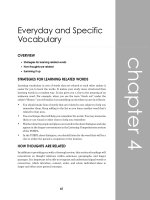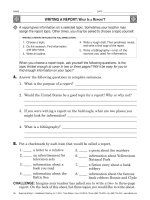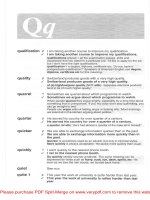Writting good or well 8 pptx
Bạn đang xem bản rút gọn của tài liệu. Xem và tải ngay bản đầy đủ của tài liệu tại đây (258.55 KB, 6 trang )
Time for some comparison shopping. Check out the following sentences. If the comparison
is logical, write “correct” in the blank. If the comparison is faulty, rewrite the sentence in
the space provided. Because some sentences may be corrected in more than one way, your
answer may differ from mine. Just be sure that your answers are logical.
Q. The average pigeon is smarter than any animal in New York City.
________________________________________________________________________________
________________________________________________________________________________
A. The average pigeon is smarter than any other animal in New York City. Pigeons are
animals, and pigeons flap all over New York. (I’ve even seen them on subway cars, where
they wait politely for the next stop before waddling onto the platform.) Without the word
other, pigeons are smarter than themselves. Penalty box! The insertion of other repairs
the logic.
11. Despite the fact that they don’t use Metrocards, subway pigeons are no worse than any
rider.
________________________________________________________________________________
________________________________________________________________________________
12. Spotting a pigeon waiting for the subway door to open is no odder than anything you see
on an average day in New York.
________________________________________________________________________________
________________________________________________________________________________
13. On a midtown corner I once saw a woman shampooing her hair in the rain, an experience
that was more weirder than anything else I’ve seen in my life.
________________________________________________________________________________
________________________________________________________________________________
14. Singing a shower song with a thick New York accent, she appeared saner than city
residents.
________________________________________________________________________________
________________________________________________________________________________
15. A tourist gawking through the window of a sightseeing bus was more surprised than New
Yorkers on the street.
________________________________________________________________________________
________________________________________________________________________________
16. Is this story less believable than what you read in this book?
________________________________________________________________________________
________________________________________________________________________________
218
Part IV: All You Need to Know about Descriptions and Comparisons
24_599321 ch17.qxp 4/3/06 11:30 PM Page 218
17. You may be surprised to know that it is more firmly fact-based than the material in this
chapter.
________________________________________________________________________________
________________________________________________________________________________
18. Tourists to New York probably go home with stranger stories than visitors to big cities.
________________________________________________________________________________
________________________________________________________________________________
19. New Yorkers themselves, of course, make worse tourists than travelers from large metro-
politan areas.
________________________________________________________________________________
________________________________________________________________________________
20. New Yorkers are more likely to become impatient than residents of small towns.
________________________________________________________________________________
________________________________________________________________________________
Double Trouble: A Sentence Containing
More Than One Comparison
Do you have trouble making up your mind? Well, yes and no. Does this statement
sound like something you’d say? If so, you probably employ double comparisons.
Some examples:
The new sculpture is as fragile as the old one, if not more fragile.
Eleanor is almost as annoying as Sarah, if not equally annoying.
Carrie’s speech on tariff reduction was as complicated as, if not more complicated
than, Jessica’s oration.
The preceding examples are correct because each falls into one of two categories:
ߜ The first comparison is completed before the second begins. The first two sen-
tences in the preceding example set follow this pattern.
ߜ The beginning of both comparisons may be logically completed by the phrase
at the end of the sentence. The third sample sentence in the preceding set falls
into this category. The first comparison in that sentence begins with the state-
ment as complicated as. Tack that statement to the conclusion of the compari-
son, Jessica’s oration, and you have a complete and logical comparison: as
complicated as Jessica’s oration. The second comparison begins with more com-
plicated than and is completed by the same statement, Jessica’s oration. Thus the
second comparison is complete: more complicated than Jessica’s oration. Because
both comparisons are completed by the same phrase, the sentence is correct.
219
Chapter 17: Apples and Oranges: Improper Comparisons
24_599321 ch17.qxp 4/3/06 11:30 PM Page 219
The most common mistake in double comparisons is to omit part of the first comparison:
Wrong: Carrie’s speech on tariff reduction was as complicated, if not more com-
plicated than, Jessica’s oration.
Why it’s wrong: Each comparison must be completed by the same phrase at the
end of the sentence. In the preceding sample sentence, the first comparison is not
completed by the phrase at the end of the sentence. The way it is now, the first
comparison reads as complicated Jessica’s oration. The word as is missing.
Right: Carrie’s speech on tariff reduction was as complicated as, if not more com-
plicated than, Jessica’s oration.
Also right: Carrie’s speech on tariff reduction was as complicated as Jessica’s ora-
tion, if not more complicated.
Double comparisons are so annoying that you may be tempted to make up your mind and
go for one statement only. I applaud that decision. But if you must give two alternatives, be
sure that each is correct. Here’s an example and a practice set of exercises. If you find an
error, rewrite the sentence. Note: More than one correction is possible with this sort of
error. Just pick one way to rewrite.
Q. Celeste put as many people — if not even more people — to sleep as Elizabeth, even
though Celeste’s speech was five minutes shorter.
A. Celeste put as many people to sleep as Elizabeth, if not even more than Elizabeth, even
though Celeste’s speech was five minutes shorter. The two comparisons should be logi-
cally completed by the same phrase, but in the original sentence, the second comparison
is faulty. The first comparison, Celeste put as many people to sleep as Elizabeth, is okay.
The second comparison in the original sentence, If not even more people to sleep as
Elizabeth, is illogical. The word than is missing. The corrected version supplies two com-
plete comparisons.
21. Celeste described every, or even more than, the provisions of the Snooty-Harvey
Tariff Law.
________________________________________________________________________________
________________________________________________________________________________
22. Elizabeth concentrated on one of the most, if not the most important, provisions of
the law.
________________________________________________________________________________
________________________________________________________________________________
23. Celeste’s choice of subject matter was equally, if not more important, than Elizabeth’s.
________________________________________________________________________________
________________________________________________________________________________
24. Elizabeth insisted on the same amount, or even more time, as Celeste.
________________________________________________________________________________
________________________________________________________________________________
220
Part IV: All You Need to Know about Descriptions and Comparisons
24_599321 ch17.qxp 4/3/06 11:30 PM Page 220
25. Celeste’s demand for a bowl of pink jellybeans during the lecture was as ridiculous, if not
more ridiculous, than Elizabeth’s request for green gummy bears.
________________________________________________________________________________
________________________________________________________________________________
Calling All Overachievers: Extra Practice
with Improper Comparisons
Figure 17-1 is an excerpt from a completely fictitious review of an imaginary restaurant,
which I designed to give you a thorough review of the rules of comparisons. Be on the look-
out for undercooked sausage, incomplete or illogical comparisons, snobby waiters, and
messed-up double comparisons. You should find ten mistakes in comparisons and about a
million reasons not to eat at this establishment. Correcting the errors may involve adding,
removing, or rearranging quite a few words. Note: Often more than one correction is possi-
ble. I supply one answer for each error in the following section, but your answer may differ
slightly and still be correct.
Pembroke Diner: You Won’t Go Broke, but You Won’t Eat Well Either
A recent meal at the Pembroke Diner on 48th Street was most
distressing. First of all, the tables are as close together, if not closer
together, than bus riders during rush hour. I truly did not want to hear my
neighbors’ conversation about their grandchildren, who are, they claim,
so smart. Nor did I want to chew each bite of steak for ten minutes
because the steak was tougher than any meat I’ve eaten in my life. The
wine list of the Pembroke is the least interesting. I am, I admit, a wine
snob, but even people who drink wine only once a year will have a hard
time finding something that is as watery, if not more watery, than the
house red. I was surprised to realize that I was less impressed than the
diners munching happily in the restaurant. Surely the Pembroke can do
better! The potato was much more raw and more expensive. I
recommend that you find a place with better food. The Pembroke must
revise its menu and its habits immediately, or the restaurant will be so
unpopular.
Figure 17-1:
A poorly
written
restaurant
review.
221
Chapter 17: Apples and Oranges: Improper Comparisons
24_599321 ch17.qxp 4/3/06 11:30 PM Page 221
Answers to Complicated
Comparison Problems
a
The trout, who is wealthier than the president of a Swiss bank, spends a lot of money on rap
CDs. The problem with the original is that you can’t tell what or who is being compared to the
trout. The missing element of the comparison must be supplied.
b
The octopus has almost as much money as the trout but prefers to keep the trout at arm’s
length. The original sentence begins the comparison nicely (almost as much money as) and
then flubs the ending (almost as much money as what? as who?). Supply an ending and
you’re fine.
c
Mermaids are the most adept at financial planning of all marine mammals, in my experi-
ence. The original comparison doesn’t specify the group in which mermaids excel. Your answer
must provide context.
d
On the other hand, mermaids are less competent at purchasing shoes than other mammals.
In the original, the reader is left to wonder about the basis of comparison. In the corrected sen-
tence, the mermaids are compared to other mammals. Now the comparison is complete.
e
Not many people realize that mermaid tail fins are as sensitive as a duck’s foot. The original
sentence contains an incomplete comparison. As sensitive as what? Who knows? The sug-
gested answer finishes the comparison by supplying another sensitive object.
f
Whales are as fashion-challenged at shoe and accessory selection as mermaids. It doesn’t
matter how you finish the comparison so long as you finish it. In the suggested answer I
plugged in mermaids, but I could just as easily have placed myself or someone else. Your call.
g
This whole under-the-sea theme has become more boring than a lecture on the economics
of pen nibs. Finish the comparison with your favorite example of excruciating boredom.
h
The marine jokes are so uninteresting that I may never go to the beach again. The so state-
ment must be completed by some sort of that statement.
i
correct. Let me explain. Normally a comparison (harder, in this sentence) must be placed in
context. In this sentence, however, the context is implied (harder than I did before).
j
correct. The phrase less than satisfying compares the comedy to an ideal state (satisfying). The
comparison is complete.
k
Despite the fact that they don’t use Metrocards, subway pigeons are no worse than any other
rider. The context makes clear that pigeons sometimes ride the subways. (I’m not kidding
about this one, honest! I have seen the little feathered guys on my train.) Without the other,
pigeons are no worse than themselves, an impossible situation.
l
Spotting a pigeon waiting for the subway door to open is no odder than anything else you
see on an average day in New York. The else serves an important purpose in this sentence; it
shows the reader that the pigeon waiting for the subway is being compared to other events in
New York City. Without the else, the sentence is irrational because then the sentence means
that seeing pigeons in New York is no odder than what you see in New York.
m
On a midtown corner I once saw a woman shampooing her hair in the rain, an experience
that was weirder than anything else I’ve seen in my life. More weirder is overkill. Drop the
more and you’re all set.
222
Part IV: All You Need to Know about Descriptions and Comparisons
24_599321 ch17.qxp 4/3/06 11:30 PM Page 222
n
Singing a shower song with a thick New York accent, she appeared saner than other city
residents. If she’s got a New York accent, she’s a city resident. Without the word other, you’re
saying that she’s saner than herself. Not possible!
o
correct. The tourist isn’t a city resident, so he or she may be compared to New Yorkers on the
street without the word other.
p
Is this story less believable than the rest of what you read in this book? The story is in the
book, and it can’t be compared to itself. The phrase the rest of differentiates the story but pre-
serves the logic. You may also correct this one by writing less believable than any others you
read in this book.
q
You may be surprised to know that it is more firmly fact-based than the other material in
this chapter. Your correction must indicate, in any of several ways, that this story is being com-
pared to the rest of the dumb jokes I placed in this chapter. The expressions other, rest, or any-
thing else can do the job.
r
Tourists to New York probably go home with stranger stories than visitors to other big cities.
New York is a big city, but the original sentence implies otherwise. The insertion of other solves
the problem.
s
New Yorkers themselves, of course, make worse tourists than travelers from other large met-
ropolitan areas. New York is a large metropolitan area, and the original indicates that it isn’t.
Trouble! Insert other and you’re all set.
t
correct. New Yorkers are compared to residents of small towns, and that comparison is legal
u
Celeste described every provision of the Snooty-Harvey Tariff Law, and even more. The orig-
inal sentence muddles two comparisons, braiding them together inappropriately. The first com-
parison is incomplete. If you untangle it, you get Celeste described every the provisions of the
Snooty-Harvey Tariff Law. You can easily see that the untangled comparison doesn’t make sense.
The second comparison is in better shape. Untangled it reads Celeste described even more than
the provisions of the Snooty-Harvey Tariff Law. One complete and one incomplete comparison
isn’t a good idea. The corrected version presents two complete ideas.
v
Elizabeth concentrated on one of the most important, if not the most important, provisions
of the law. Or, Elizabeth concentrated on one of the most important provisions of the law, if
not the most important. The original is faulty because the first comparison cannot be com-
pleted logically by the words supplied in the sentence. In the original sentence, the first com-
parison reads one of the most provisions of the law. Penalty box! The word important is missing.
The two corrections supply important.
w
Celeste’s choice of subject matter was equally important, if not more important than
Elizabeth’s. In the original sentence, the first comparison is incomplete: equally Elizabeth’s. In
the rewritten version, each separate comparison makes sense. Comparison one: equally impor-
tant. Comparison two: more important than Elizabeth’s.
x
Elizabeth insisted on the same amount of time as Celeste, or even more time than Celeste.
In the original sentence the second comparison is incomplete as written. The than is missing.
In the corrected version each of the two comparisons works separately. Comparison one: the
same amount of time as Celeste. Comparison two: more time than Celeste.
y
Celeste’s demand for a bowl of pink jellybeans during the lecture was as ridiculous as
Elizabeth’s request for green gummy bears, if not more ridiculous. In the original sentence the
first comparison is incomplete because it contains only one as. If you untangle it from the second
comparison, you hear what’s missing: Celeste’s demand for a bowl of pink jellybeans during the lec-
ture was as ridiculous than Elizabeth’s request for green gummy bears. The corrected version con-
tains two complete comparisons.
223
Chapter 17: Apples and Oranges: Improper Comparisons
24_599321 ch17.qxp 4/3/06 11:30 PM Page 223









